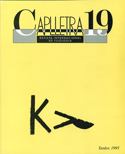Analogia i canvi morfològic: a propòsit de les formes verbals velaritzades
DOI:
https://doi.org/10.7203/caplletra.19.7376Keywords:
morfologia, canvi morfològic, analogia, formes verbals velaritzades Abstract
Abstract
An important series of verbs of the second conjugation exists in Catalan, characterized by a velar obstruent between the radical and the inflectional affixes. This velar segment, which in modern Catalan acts as an extension of the radical, has a heterogeneous historical origin. In short, in certain cases it stems from the strengthening of the glide of the Latin strong perfects in -UI (where w > gw > g); in others, it is justified by the maintaining of the final consonant of the radical in certain forms of the present in verbs such as dico or stringere (DICO > dic, DICAM > diga ...); in others, finally, it is due to changes of a purely analogical nature. In order to explain the latter changes, the theoretical framework of Natural Morphology has been adopted, and the analogical processes are considered to be motivated by a set of principles of morphological naturalness or optimization. To be exact, the inflectional class stability principle, the system congruity principle, the uniformity and transparency principle, and the constructional iconicity principle.
 Downloads
Downloads
Downloads
Published
How to Cite
-
Abstract548
-
PDF (Català)656
Issue
Section
License
Authors submitting work to Caplletra for publication must be the legitimate holder of the usage rights. Legitimacy for the purposes of publishing the work must also include images, tables, diagrams and any other materials that may complement the text, whether they are the author of such material or not.
Copyright: on publishing their work in the journal, the author grants Caplletra. Revista Internacional de Filologia usage rights (reproduction, distribution and public communication) for both the paper printed version and for the electronic version.
All work published in Caplletra is covered by the Creative Commons license type Attribution-NonCommercial-NoDerivatives 4.0 (CC BY-NC-ND 4.0).
RESPONSABILITY
Caplletra. Revista Internacional de Filologia does not necessarily identify with the points of view expressed in the papers it publishes.
Caplletra. Revista Internacional de Filologia accepts no responsibility whatsoever for any eventual infringement of intellectual property rights on the part of authors.






